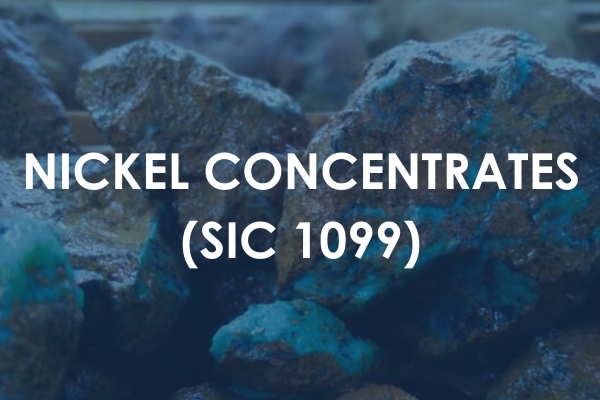- Topics
- Themes
-
Trade
Do you want to know how access to trade finance can increase your cross-border imports and exports? Explore our Trade Finance hub for practical tools.
Treasury
Are you a treasury or operations manager looking to mitigate the risks and efficiently manage your business’ cash flow? If so, check out our Treasury Management hub.
Payments
Whether you want updates from infrastructure support to cross-border transactions or clearing house operations to processing techniques, you can find all on our Payments hub.
Letters of Credit
Ready to to increase your imports / exports to guarantee the payment and delivery of goods? Find out more about LCs here.
Shipping & Logistics
Whether you’re transporting goods, or learning about supply chains, warehousing, transportation and packaging, we’ve got you covered.
Incoterms
Need to know which International Commerce Term is right for your needs? Explore our curated guides from shipping expert Bob Ronai.
Sustainability
Prioritising sustainable supply chains? Building inclusive trade? Working towards the UN’s 2030 SDGs? Read the latest on global sustainable standards vs green-washing here.
Customs
Heading into international markets? From the correct documentation to standardisation, here’s what you need to know for a streamlined customs clearance process.
TradeTech
TradeTech is rapidly evolving to help reduce some of the biggest challenges when it comes to trade. Keep up with these innovations here.
-
- News & Insights
-
News
The latest in Trade, Treasury & Payments - stay up to date on all the changes across the globe.
Magazines
The issues feature experts across the industry on the latest developments with specific themed and regional editions.
Articles
Insights by the industry, for the industry. These include thought leadership pieces, interview write ups and Q&As.
Guides
Working closely with industry experts and trade practitioners we provide inclusive educational guides to improve your technical knowledge and expertise in global trade.
Research & Data
We undertake qualitative and quantitative research across various verticals in trade, as well as create reports with industry association partners to provide in-depth analysis.
Trade Finance Talks
Subscribe to our market-leading updates on trade, treasury & payments. Join the TFG community of 160k+ monthly readers for unrivalled access in your inbox.
-
- Media
- Events
-
Partner Conferences
We partner with industry conferences around the world to ensure that you don’t miss out on any event; in person or online, add to your calendar now.
Women in Trade, Treasury & Payments
Get involved in our most important campaign of the year, celebrating the achievements of women in our industry and promoting gender equity and equality.
Awards
Our excellence awards in trade, treasury, and payments are like no other. You can't sponsor them, and they're independently judged. They are the most sought-after industry accolades.
Online Events
Join our virtual webinars and community events. Catch up on-demand, right here on TFG.
-
- Editions
- Themes
- Access Finance
- Finance Products
-
Trade Finance
Trade finance is a tool that can be used to unlock capital from a company’s existing stock, receivables, or purchase orders. Explore our hub for more.
Invoice Finance
A common form of business finance where funds are advanced against unpaid invoices prior to customer payment
Supply Chain Finance
Also known as SCF, this is a cash flow solution which helps businesses free up working capital trapped in global supply chains.
Bills of Lading
BoL, BL or B/L, is a legal document that provides multiple functions to make shipping more secure.
Letters of Credit
A payment instrument where the issuing bank guarantees payment to the seller on behalf of the buyer, provided the seller meets the specified terms and conditions.
Stock Finance
The release of working capital from stock, through lenders purchasing stock from a seller on behalf of the buyer.
Factoring
This allows a business to grow and unlock cash that is tied up in future income
Receivables Finance
A tool that businesses can use to free up working capital which is tied up in unpaid invoices.
Purchase Order Finance
This is commonly used for trading businesses that buy and sell; having suppliers and end buyers
-
- Sectors
-
Machinery & Equipment
Technology, construction, telecommunications, PPE, and electronics
Commodities & Materials
Raw materials, agricultural products, minerals, metals, and textiles
Chemical & Energy
Pharmaceuticals, chemicals, and energy products
Autos, Aerospace & Marine
Automotive, aviation, and marine industries
Pharma & Healthcare
Pharmaceuticals, healthcare equipment, and related sectors
Metals & Mining
Ores, minerals, metals, and concentrates
Finished Goods
Retail stock, e-commerce, textiles, clothing, and consumer goods
Construction & Projects
Construction, infrastructure, project finance, and green finance
Tech, Media & Telecom
Construction, infrastructure, project finance, and green finance
Food & Beverages
Food, drink, dairy, confectionery, and alcohol
Professional Services
E-commerce, recruitment, legal services, and hospitality
-
- Case Studies
-
Informing today's market
Financing tomorrow's trade
Soft Commodities Trader
Due to increased sales, a soft commodity trader required a receivables purchase facility for one of their large customers - purchased from Africa and sold to the US.
Metals Trader
Purchasing commodities from Africa, the US, and Europe and selling to Europe, a metals trader required a receivables finance facility for a book of their receivables/customers.
Energy Trading Group
An energy group, selling mainly into Europe, desired a receivables purchase facility to discount names, where they had increased sales and concentration.
Clothing company
Rather than waiting 90 days until payment was made, the company wanted to pay suppliers on the day that the title to goods transferred to them, meaning it could expand its range of suppliers and receive supplier discounts.
-
- Search
- Get Trade Finance
- Finance Products
- About Us
- Talk To Us
Nickel Concentrates (SIC 1099)


Access trade, receivables and supply chain finance
We assist companies to access trade and receivables finance through our relationships with 270+ banks, funds and alternative finance houses.
Get startedContent
Understanding nickel concentrates: Production, applications, and market dynamics
Nickel concentrates play a crucial role as intermediaries in the metallurgical industry.
They facilitate the transition from raw nickel ore to refined nickel products and ensure a consistent supply of nickel, which is crucial for numerous industrial applications.
With the increasing global reliance on nickel, especially in advanced technologies, stakeholders need to deeply understand the characteristics and market dynamics of nickel concentrates.
Production landscape
Nickel is mined extensively in regions abundant in mineral deposits, such as Indonesia, the Philippines, and Russia.
The production process involves several steps: mining the ore, crushing, grinding, and flotation, which enhances the nickel concentration to about 10-20%.
This process increases the nickel content and allows for the recovery of valuable by-products like cobalt and platinum group metals, adding significant economic value to the operations.
Chemical composition and properties
Nickel concentrates are predominantly composed of nickel, but depending on the ore source and extraction methods, they may also include cobalt, copper, and platinum group metals.
The variability in composition affects refining processes and the range of potential applications, making precise analysis and handling essential.
Applications in various industries
Refined nickel derived from these concentrates is employed in several critical areas:
- Stainless steel fabrication: Nickel is integral to producing stainless steel–valued for its durability and resistance to corrosion–which is crucial in automotive, construction, and household appliances.
- Battery production: Nickel is vital in manufacturing rechargeable batteries, particularly lithium-ion batteries used in electric vehicles and portable electronic devices.
- High-performance alloys: Nickel is essential for producing alloys used in the aerospace, military, and energy sectors due to its robustness against extreme temperatures and corrosion.
Influences on the market
Various market forces and regulatory frameworks shape the demand for nickel concentrates:
- Demand from key industries: The need for nickel in the electronics and automotive industries, especially for battery production and stainless steel, drives significant demand for nickel concentrates.
- Global trade dynamics: International policies and geopolitical situations in nickel-rich countries can affect the concentrate supply and pricing, with disruptions potentially causing significant market fluctuations.
- Regulatory impact on production: Environmental concerns related to nickel mining and processing have led to stringent regulations, affecting production costs and concentrate availability by enforcing stricter pollution and waste management standards.
Price dynamics
Multiple factors influence the pricing of nickel concentrates:
- Industry demand: Increases in demand from primary nickel-using sectors directly impact concentrate prices.
- Ore quality and accessibility: The quality and accessibility of nickel ore reserves are critical in determining the efficiency of concentrate production, affecting supply and market prices.
- Refining efficiency: The capability and modernisation of refining technologies are crucial in meeting market demand and can influence the pricing structure of nickel concentrates.
Market transactions and financial tools
Nickel concentrates are commonly traded in the spot market, allowing for rapid adaptation to price changes.
They are also subject to forward and futures contracts to stabilise prices.
Financial tools like letters of credit are essential for secure payments and smooth international trading.
Trade specifications
Nickel concentrates are part of a complex global trade network and are universally traded in US dollars per metric ton.
This currency standardisation simplifies the trading process by providing a consistent pricing model across various international markets. Thus, currency conversion complexities are eliminated, and financial risk is reduced for traders.
Nickel concentrates are assigned specific Harmonised System (HS) codes, which are internationally recognised codes used to classify traded products.
These codes are crucial for several reasons: they help streamline customs processes by quickly identifying the nature of goods, ensure that all imports and exports comply with international trade regulations, and facilitate the efficient application of tariffs.
By using these HS codes, customs authorities can efficiently manage and monitor the import and export of nickel concentrates, enabling smoother transactions and helping to prevent delays in shipping and logistics.
These codes also assist in gathering statistical data that governments and international bodies use to monitor trade flows and trends, which can influence economic policy and trade agreements.
Strategic insights
Stakeholders in the nickel industry must thoroughly understand nickel concentrates’ production, application, and market intricacies.
This knowledge enables industry players to enhance their operational strategies and capitalise on emerging market opportunities.
–
Mastering the complexities of nickel concentrates—from extraction through to market integration—is vital for stakeholders in this essential sector.
By staying informed about production processes, market demands, and regulatory changes, industry participants can optimise their strategies and position themselves to take full advantage of growth opportunities in the dynamic global nickel market.
What is the SIC Code for Metals Concentrates?
SIC Code
1099
Nickle Ore
More information about other metals concentrates
Case Study

TFG facilitated the financing of 150 metric tonnes of nickel concentrates transported from a supplier in Indonesia to a customer in South Korea using a structured trade finance facility. The financing solution included a combination of export credit insurance and receivables discounting. Export credit insurance mitigated the risk of non-payment for the Indonesian supplier, ensuring they received payment despite potential buyer default. Receivables discounting allowed the South Korean buyer to extend payment terms by selling their receivables at a discount to TFG, maintaining cash flow without impacting the supplier.






















